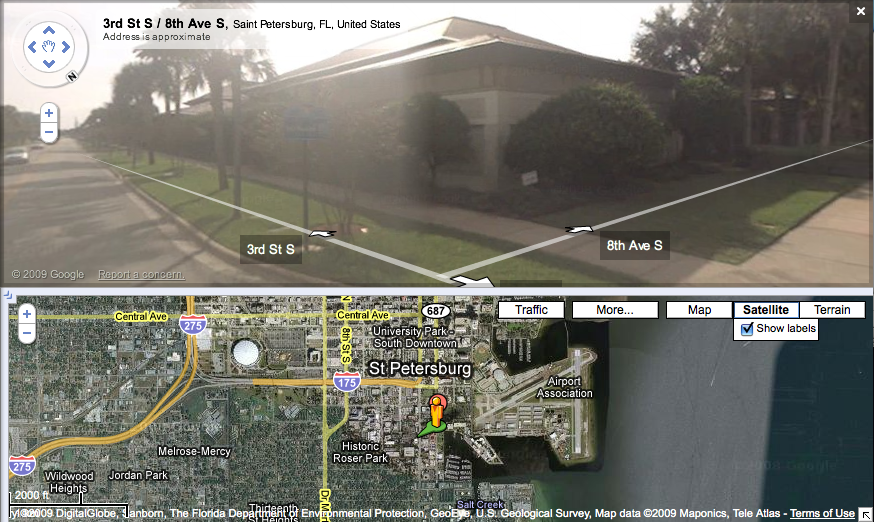I’ll be gathering tweets and posting updates from the Poynter programming for journalists/journalism for programming seminar (see previous post) in this CoverItLive blog.
Tag: Poynter
Returning to Poynter: I’ll be attending the programming for journalists seminar

Next week — Aug. 25-27, to be exact — I’ll return to my native Florida for a great opportunity at the Poynter Institute: a seminar that aims to teach journalists about programming and programmers about journalism. From the description:
Journalists will learn the programmer’s mindset, and programmers will learn how to see the world through a journalist’s eyes. Programmers will teach journalists how to turn data into usable information — and share great examples of efforts that worked.
The seminar also covers computational thinking, something I’ve written about previously. Needless to say, I can’t wait to discuss with other 15 or so attendees and instructors.
From the seminar page (with some links changed), the instructors include:
- Regina McCombs, Visual Journalism Faculty, Poynter
- Aron Pilhofer, Editor, Interactive News Technologies at The New York Times
- Matt Waite, Senior News Technologist, St. Petersburg Times/tampabay.com and PolitiFact
- Jeremy Bowers, News Technologist, St. Petersburg Times/tampabay.com
- David Stanton, Technology Fellow, Poynter
- Steve Myers, Managing Editor, Poynter Online
I know/have met in-person all of them — except Jeremy, who I look forward to meeting for the first time — and know that this will be an awesome seminar. Also, thanks to a handy Twitter search for “Poynter seminar,” I’ve seen a few tweets from others will who be attending. I look forward to meeting all of them soon.
Finally, a big thanks to Poynter for awarding me a partial scholarship for the seminar, made possible by the Ford Foundation. And thanks to Regina, Steve and Dave for answering my questions about the seminar.
UPDATE: The hashtag will be #journprog.
Poynter fellows’ e-mail thread: Response to a “social media” question
One of my fellow former fellows asked our pcf09 Google Group about social media, singling me out near the end of her message. After I wrote this response (sent 6:33 p.m. CT), I thought “sharing is caring,” so here you go!
Whoa, I kinda feel on the spot. Well, um… I’m going to cop out and defer to some smarter people/sites/articles except to say that I think some of the most important things to understand, for this group of already amazing storytellers and journalists, are the fundamentals of what’s changed/how things continue to change in news/media/journalism and everything related to engagement. Challenge your assumptions about how things have been done and should be done and always try to step back and think outside the conventional MSM wisdom.
Sorry, this kinda turned into a brain dump:
1. I’ve been compiling a heapin-o-links. Disregard the guidelines part — it’s basically links for online engagement as it relates or can relate to journalism.
http://www.publish2.com/newsgroups/social-media-guidelines
2. Some interesting presentations here:
http://www.slideshare.net/greglinch/favorites
3. Extremely insightful discussion by two brilliant minds on this podcast with Jay Rosen and Dave Winer (I started from the beginning; almost all caught up. Only 19 episodes so far). [Gah! Forgot to mention “sources go direct” in the e-mail]
4. I’ve been slowly consuming Here Comes Everbody by Clay Shirky, another brilliant guy (see Newspapers and Thinking the Unthinkable). Not for lack of interest, just the opposite actually. My approach has been to read a section or chapter or two at a time, usually before bed. That let’s the ideas marinate and gives me more time to think on the details and take more away from it, versus speed-reading more for the big concepts.
http://www.shirky.com/herecomeseverybody
5. Next up on my list is What Would Google Do by Jeff Jarvis.
http://www.buzzmachine.com/what-would-google-do
6. One specific idea (see all related comments and posts) of “newsroom as a cafe:”
http://www.danielbachhuber.com/2009/06/12/newsroom-as-a-cafe
http://www.digidave.org/2009/02/journalism-business-idea-the-newsroom-cafe.html
http://steveouting.com/2008/02/29/why-news-companies-should-go-into-the-internet-cafe-business/
7. I want to start paying a different kind of attention to the tech industry, specifically hows and whys as opposed to “oooh, that’s a cool shiny new toy.” Journalism is becoming much more like it as the two overlap more and more.
Everyone, please share any of your favorite links, read, listens, etc.!
Best,
Greg
<exhale />
WATCH LIVE: Bill Couch of USA Today at Poynter Fellowship 2009
Bill Couch livestream and liveblog.
Please check back for archived video, which will be embedded here.
Liveblog
I’ve been selected for the Poynter Fellowship for College Journalists 2009
I learned Tuesday by e-mail that I’ve been selected as one of 40 students to participate in the Poynter Fellowship for College Journalists this summer. It takes place May 17-29 at the Poynter Institute in St. Petersburg, Fla.
 I doubt that it needs to be said, but I’m extremely excited. As I wrote in my essay, I’m looking forward to not only learning from some of the most respected journalists in the field, but also to learn from my peers.
I doubt that it needs to be said, but I’m extremely excited. As I wrote in my essay, I’m looking forward to not only learning from some of the most respected journalists in the field, but also to learn from my peers.
Oh, and did I mention, the tuition is free!
After a little research, I’ve found 10 others who have been accepted, nine of whom I found through Twitter search.
One of my tweeps is listed as alternate. We’ve never met, but I hope she has the opportunity to attend because I know she’s a very talented college journalist.
As for how this effects my summer plans, it doesn’t change anything. I will go to my internship at the Dallas Morning News, which I am also eagerly anticipating, soon after the fellowship.
In short, I proclaim this the summer of Greg!
PS. I can’t believe I’m graduating in a little more than two months. Where have the college years gone?